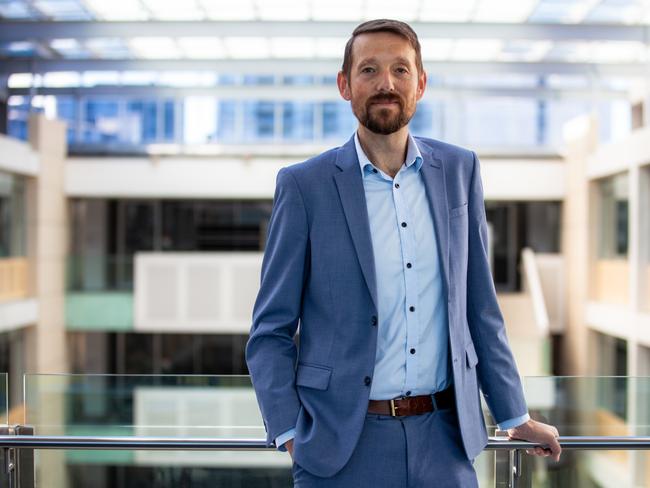Future Qld Resources: Industry struggles to attract staff despite generous pay
Workers in this industry earn 56 per cent more than the average Australian, but there are growing fears there won’t be enough staff over the next 20 years.

QLD News
Don't miss out on the headlines from QLD News. Followed categories will be added to My News.
Workers in the resources industry earn 56 per cent more than the average Australian, but despite an average salary of $150,000 there are growing fears there won’t be enough staff to support the sector over the next 20 years.
Resource industry leaders say misconceptions and the current anti-coal sentiment, as well as stiff competition from the construction industry, are driving current and future workers away from mining as a career path.
This story is part of The Courier-Mail’s special Future Queensland: Resources series that reveals the truth about the contribution the much-maligned resources industry makes to Queensland. You can read all of our coverage here
But those who have flocked to the industry say the benefits include being able to save for a house deposit in as little as three years, frequent holidays overseas and a more stable family income during the current cost-of-living crisis.
The latest Australian Bureau of Statistics data show the average full-time earnings in the mining industry are about $2951.80 a week – 56 per cent higher than the average Australian’s weekly wage, which is $1880.80.
Resources has the highest average earnings for women across any industry – but men earn about $400 more per week.
Mining jobs have increased by 30 per cent over the past five years, compared with the total jobs across the whole labour market which have increased by 13 per cent.
But there are 63 per cent more vacancies than before the pandemic and more than 5300 jobs available in mining and resources in Queensland, according to job website Seek.
ABS head of labour Bjorn Jarvis said the mining industry accounted for about 1.4 per cent of all filled jobs in Australia.
“You’ve got a growing part of the economy trying to fill jobs when it is still a very tight labour market,” Mr Jarvis said.
Mackay-based Resources Centre of Excellence general manager Steven Boxall said the worker shortage was “right upon us now”.
“When you look at all the construction that’s happening in South East Queensland, the money that’s being spent by the government in civil projects like roads and tunnels,” he said.
“And then we’ve got the infrastructure for the 2032 Olympics.
“I think we’re already at a tipping point where we don’t have enough people to work in the sectors that we need.”

About 50 occupations are experiencing shortages, ranging from administration and clerical roles, boilermakers, diesel fitters, electricians to engineers.
Workers with skills and qualifications in environmental science and engineering are being sought as the industry continues to decarbonise its operations and contribute to lower emissions target.
Queensland Resources Council chief executive officer Janette Hewson said: “The road to net zero runs through the resources sector and workers with skills in this area are an increasingly important contributor to mining operations.
“We need a mix of traditional skills and new skills, for example digital, decarbonisation and processing as the critical minerals sector expands.”
She said concerns over skilled worker shortages stretched beyond the mining sector and was a phenomenon being felt across all industries and agriculture.
Ms Hewson said the sector had a number of avenues targeting new workers as well as focusing on retention, including programs earmarked for school students from Year 9 to 12 showing real life applications for science, technology, engineering and mathematics.
“We’ve got a lot of data that shows us that by engaging with school students and bringing STEM to life and actually showing them what types of careers are waiting for them once they finish school, that that’s having a really positive impact in terms of bringing people across,” she said.
Ms Hewson believed the shift away from the resources industry was being more felt in urban areas, as regional areas had more of a connection and an understanding of the sector.
“In terms of urban areas, then I think that obviously young people are concerned about ESG. They are concerned about net zero,” she said.
“And one of the really important things that we can do is to explain what is it that our industry is doing to achieve net zero.

“It’s very important for us to communicate that if you join the resources sector, you can actually be part of the solution to getting to net zero, and you can be part of that solution in terms of responsible environmental stewardship as well.”
According to the latest Australian jobs and skills report, the six largest employing occupations in the mining sector are drillers, miners and shot firers, metal fitters and machinists, truck drivers, other building and engineering technicians, electricians and mining engineers.
The industry continues to have the highest average weekly earnings of all industries.
A spokesman for Bravus, which runs the Carmichael coal mine in cental Queensland, said the company dishes out on average more than $1.6m in wages each week.
“That sort of economic stimulus makes an enormous difference not only to the workers that earned the money, but to the prosperity of their home towns and the local coffee shops and restaurants, car dealerships and other services businesses where they spend their wage,” he said.
“Entry-level and semi-skilled hospitality roles will typically attract a salary of $70,000 to $80,000 working a two-weeks-on, one-week-off roster, with operator roles earning from approximately $120,000 a year working a week-on, week-off or “even time” roster,” a Bravus spokesman said.
A spokesperson for gas giant Senex said young people were “critical to the future success of our industry”.
“Over the past year we’ve seen a healthy increase in applications from younger people. In 2023, 19 per cent of our workforce was under 30 years of age and we welcomed an intern and graduate intake throughout the year,” the spokesperson said.
This year, we’ve seen this interest continue to strengthen.
“Natural gas will be an integral and essential industry within Queensland for generations to come so it’s important as a sector and business we are ready to deliver.”
More Coverage
Originally published as Future Qld Resources: Industry struggles to attract staff despite generous pay



